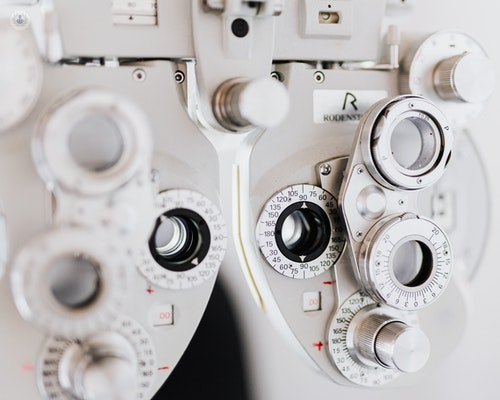Dry eye syndrome after cataract surgery
Written by:Anyone who has received eye surgery is susceptible to experiencing dry eye. Mr Bal Manoj is a specialist in the field of cataract surgery and is also an expert in assisting patients with aftercare. In this article, Mr Manoj explains why dry eye occurs, how common it is and the treatment available. He also shares his advice for avoiding dry eye.

What are the symptoms of dry eye syndrome?
Dry eye syndrome is a condition that, for the vast majority of sufferers, involves only slight irritation. Symptoms are almost always mild and it’s very rare to experience serious symptoms such as blurry vision.
Common symptoms are:
- Watery eyes
- Gritty eyes
- Feeling like something is stuck in the eye (like an eyelash)
- Intermittent sharp pain
These symptoms can occur in anyone with dry eye no matter the cause. If a patient already had the condition before cataract surgery, the symptoms can be aggravated post-surgery for a time.
Why does dry eye occur/worsen after cataract surgery?
Dry eye syndrome is experienced after cataract surgery because the two micro-incisions made during surgery cut through the corneal nerves. These nerves sense if there are enough tears on the surface of the eyes and if there isn’t enough to lubricate them, the nerves will tell your brain to produce more.
When the nerves are cut and healing post-surgery, the feedback loop between your cornea and brain is temporarily disrupted. This results in an unbalance of tear production that leaves them dry. However, this feedback will regulate once the nerves have healed.
Post-operative antibiotic drops can contribute to disrupting the distribution of tears over your eye surface, but it’s highly important that these drops are used.
Do all patients get dry eye syndrome after cataract surgery?
In my practice, about a quarter to a third of patients experience dry eyes after undergoing cataract surgery. For almost all of them, their dry eyes are very light on the spectrum of how irritating dry eyes can be.
For those who already had dry eyes before their cataract surgery, they will continue to experience the symptoms if they don’t use their eye drops after surgery.
What’s the treatment for post-cataract surgery dry eye syndrome?
Post-operative antibiotic drops are given to patients after surgery to stop infection and inflammation from occurring. If you experience dry eye despite taking these drops and it’s causing you a lot of discomfort, you can get over-the-counter lubricant drops and use them usually three to four times a day maximum.
It is very important that you wait until at least 10 minutes after you’ve inserted your prescribed post-operative antibiotic drops before inserting the over-the-counter drops. This is to allow your cataract surgery drops to be fully absorbed.If you do it in reverse order or don’t wait long enough, the cataract drops may bounce off the surface of your eye and won’t be absorbed.
Is dry eye after cataract surgery permanent?
- After three to four days, your eye should be free from dry eye symptoms caused by the surgery.
- In some, particularly those who had dry eye before surgery, it may take a few more days or a week to recover.
- The vast majority of patients are completely free of dry eyes within a couple of weeks, for some others this will happen within a couple of months.
As we age, we have more of a tendency to experience dry eye syndrome. While someone may not have had dry eye syndrome before cataract surgery, they may have been destined to have it eventually and cataract surgery brought the symptoms on sooner. In this case, a person may need long term eye drops.
Will dry eye syndrome make my eyes take longer to heal after cataract surgery?
The healing process will still be the same. Dry eyes won’t make your eyes take longer to heal and at most, they will increase irritation only slightly.
Advice on what to avoid for dry eyes
The following advice is applicable to dry eyes in general, not only after cataract surgery:
- Avoid dusty and dry environments. Dry eye syndrome is more frequent during the winter months if you use central heating because the dry, heated air evaporates the tears in your eye.
- Avoid windy conditions. You may have experienced watery eyes when you’re out in windy weather – this is your eye producing more tears to fight the dryness brought on by the wind.
- Avoid cosmetics such as mascara, eyeshadow, eyeliner and eyelid creams.
- If you use laptops and other screens frequently, make sure you blink frequently. People often blink less than they should while staring at a screen, leaving the eye less lubricated.
Mr Bal Manoj is a leading cataract surgeon in the Midlands and has performed countless cataract surgeries. Don’t hesitate to view Mr Manoj’s Top Doctors profile and book a consultation.



